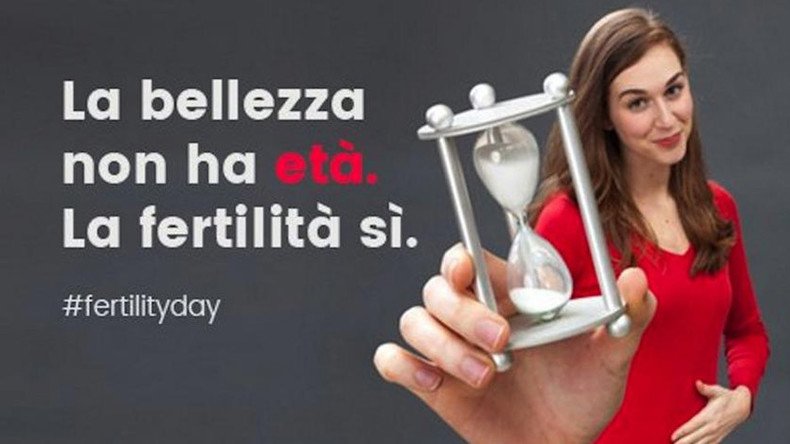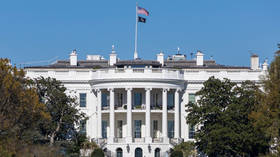Italy’s campaign to up fertility aborted prematurely after feminist backlash

A government ad campaign to boost one of the world’s lowest birth rates has wrapped up before due term after critics dismissed it as patronizing, accusatory and sexist.
On Friday, Health Minister Beatrice Lorenzin said she would make unspecified “changes” to a campaign that began only Wednesday, and was meant to build up to Fertility Day, scheduled for September 22, when public festivals staffed with doctors, family advisers and baby product sales reps are supposed to take place in four cities across the country.
The fate of the misconceived campaign was likely sealed a day earlier, when Prime Minister Matteo Renzi stepped in himself, to criticize Lorenzin.
“If you want to create a society that invests in its future and has children, you have to make sure the underlying conditions are there,” Renzi said in a radio interview. “I don’t know of any of my friends who had kids after they saw an advertisement.”
But Renzi, who has three children, was riding a cresting wave of a Twitter storm that had begun almost as soon as the handful images were released.
Many of them either cajole families into having a baby, or warn that they could miss their chance.
"we don't need feminism" they said #fertilitydaypic.twitter.com/Ya5lHko1FS
— Haveyoumetila? (@haveyoumetila) August 31, 2016
"Beauty has no age. But fertility does," says one slogan, next to a woman holding up an hourglass.
"Get a move on! Don't wait for the stork," says another, beside a picture of an empty nest.
“The constitution protects conscious and responsible procreation,” says a third, with an Italian tricolor ribbon weaved around a pair of baby shoes.
Some are aimed at men.
La banana di #fertilityday fa molto commedia anni '70 il creativo e' Pierino o Lino Banfi? @fnicodemopic.twitter.com/OQ5gGWiRPj
— carlo scatozza (@carloscatozza) August 31, 2016
“Male fertility is much more vulnerable than you might think,” says a caption of a picture of a wilting banana.
Others at health, such as a picture of a man holding a cigarette, with the strapline "Don't let your sperm go up in smoke."
Although the campaign went for a number of targets, Italian feminists were first to express displeasure.
So embarrassed to live here.
— stacy ✖ (@fxckoffmyface_) September 1, 2016
You want women to work and empower themselves but then make them stay at home and have children?#fertilityday
this campaign is absolutely ridiculous and sexist, a woman's bomb IS NOT a national property #fertilityday
— cami (@JULlANNESMOORE) September 2, 2016
The blogger and radio host Giulia Blasia called the campaign “a straight-up attack on the idea that fertility and the body are a private matter.”
She called the mission statement of the drive “the stuff of dystopian novels and fascist propaganda, something Benito Mussolini was quite good at in times when contraception was unavailable and women did not have the right to vote, much less work outside the home.”
Other observers homed in on the lack of economic opportunities – such as the youth unemployment of just under 40 percent – that meant that many young Italians cannot afford to start a family, and are still living with their parents well into adulthood.
"Before bringing children into the world, women responsibly consider the future," said the 5-Star Movement, an anti-establishment party that is currently leading in the polls. “People aren't having kids because it's not possible."
@bealorenzin#BabyGeorge da #BuckinghamPalace voleva dire la sua. #BabyGeorgeTiDisprezza#PoveryDay#FertilityDaypic.twitter.com/W8nStqGw3K
— Francesca Monaco (@LaFra77) September 2, 2016
A popular meme replaced the model in the hourglass advert with a photo of Prince George of England, with the caption “As if you have the money to have children.”
Another group of observers said that the campaign was hurtful to those suffering from fertility, health or social problems that prevented them from being able to conceive, or even find a partner. For them, being chided for not starting a family sounds like a bitter rebuke.
Lorenzin was forced to backtrack, taking down the website, and issuing a full apology for the stillborn campaign.
"We did not intend to offend or provoke anyone. If the message has not gone across as we would have liked, we will change it," promised the center-right politician, who has been in her post for the past three years.
While the ad series might have been shot down in flames, the demographic deficit in Italy cannot be so lightly dismissed.
#italy scary birth and death #demograpy trend.
— Daniele Baggio (@baxtheman) August 24, 2016
git pull babies? pic.twitter.com/l9OfSL5eq1
The fertility rate in Italy is 1.35 children per woman – compared to 1.6 in the EU and 2.65 across the world – and last year the country recorded the fewest live births since it became a nation state in 1861.













